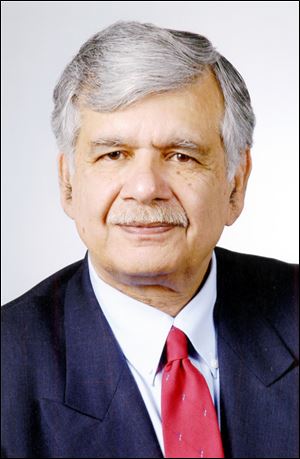
COMMENTARY
Pakistan paying for fallout
Soviets’ Afghan invasion in 1979 lingers today
7/7/2014
Hussain
The Pakistani army’s aerial attacks against Taliban hideouts in tribal areas are showing results. There are confusion and disarray in their ranks. Some important players in the Taliban movement have been killed.
The raids also confirmed the long-standing belief that many foreign nationals were taking part in terrorist attacks against the state and people of Pakistan. Among those killed or captured during the recent bombings were Chechens and Uzbeks.
What are foreign nationals doing thousands of miles from their homes, in the tribal badlands of Pakistan? To answer that question, we need to go back to 1979, when the Soviet Union invaded Afghanistan.
A ragtag army of freedom fighters, the mujahedeen, resisted the Soviet occupation. The United States, other Western countries, and Saudi Arabia supplied them with arms and ammunition. Between 1979 and 1989, thousands of young Muslim men from around the world went to Afghanistan to join the jihad against the infidel Soviets.
The mujahedeen and other foreign fighters believed the United States and the rest of the West would also help resolve geopolitical issues in Kashmir and Palestine. They did not understand that each problem has its own dynamic. There are no permanent friendships or alliances on such thorny matters.
Encouraged by the triumph of the Taliban in Afghanistan in the mid-1990s, the Pakistani Taliban thought they could wage a war of terrorism against that country’s civilians, armed forces, and police. The Taliban have been carrying on with impunity from the Waziristan region of Pakistan.
The Pakistani army was prevented from waging an all-out campaign against the Taliban by successive civilian governments, for domestic political reasons. In 2009, however, Pakistan’s army took decisive action in the Swat region.
The army eliminated Taliban who had set up a de facto government there. A similar operation in Waziristan did not occur, although the United States had urged Pakistan to conduct.
This year, Pakistani Prime Minister Nawaz Sharif surprised everyone by entering into negotiations with the Taliban. But those talks were doomed from the beginning.
Unlike the Afghan Taliban, the Pakistan Taliban don’t have a unified command structure. Different groups engage in terrorist acts, and are not bound by any agreement that the main Taliban group reaches with the government.
Before negotiations began in March, both parties agreed to observe a cease-fire. But the Taliban could not keep the promise.
While negotiations continued, some Taliban elements continued terrorism within Pakistan. The breaking point came when Taliban forces attacked Karachi’s airport last month.
Since then, the army has pounded Waziristan with aerial bombardment and limited ground operations. But the army can do only so much without public support.
Religious political parties in Pakistan oppose full-fledged military operations. Most Pakistanis decry violence and terrorism, at least in public.
But they are loath to back significant action against the Taliban. Religiously inclined people don’t want Pakistan to wage a war against fellow Muslims, even those who have been bringing havoc to the country and its people.
The religious parties also know that if the Taliban take over Pakistan, they would rely heavily on religious leaders to help run the country. During the dictatorship of Gen. Mohammad Zia ul-Haq from 1978 to 1988, Jamaat-e-Islami, a major religious political party, helped run Pakistan and was responsible for the so-called Islamization of the country.
Pakistan has played a heavy price for its alignment with American interests in Southeast Asia. As a frontline state against the Soviet occupation of Afghanistan, it suffered consequences beyond imagination.
That conflict planted the seeds of religious intolerance, and a pervasive gun culture that did not exist prevously. The current Taliban conflict is a product of that earlier process.
Dr. S. Amjad Hussain is a retired Toledo surgeon whose column appears every other week in The Blade.
Contact him at: aghaji@bex.net